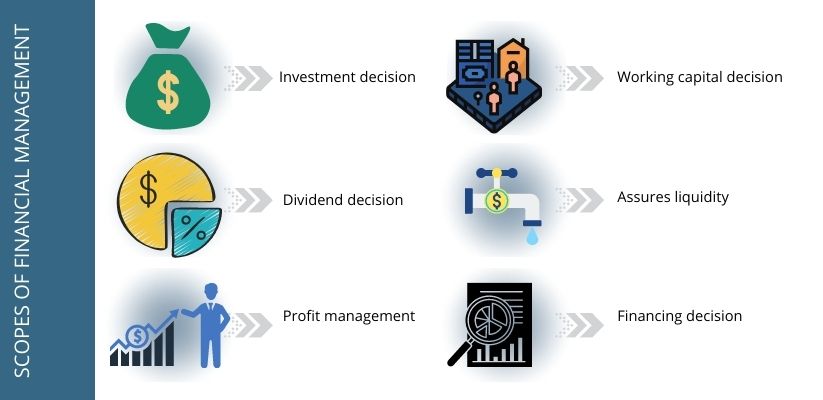Summary- Finance management plays a vital role in all kinds of businesses and it is the backbone of any organization. Various factors, including profit or loss, are closely related to financial management. Let us discuss the scope of financial management in this post.
Let us first learn what financial management is?
Financial management is all about organizing, directing, strategic planning, and manipulating financial rules in a company. It also embraces deploying management principles to the economic features of an organization. It is a pivotal part and is considered the backbone of all businesses. Financial management has the modern approach that makes sure that required funds are always available from different sources in organizations while also helping organizations to earn high ROI.
In this post, we will discuss the scope of financial management in detail.
So, the prime scopes of financial management include:
- Investment decision
- Working capital decision
- Dividend decision
- Assures liquidity
- Profit management
- Financing decision
Let us discuss each of the scope of financial management in detail.
Investment decision
The primary objectives of financial management are thoroughly involved in managing a company’s investment decisions. This includes determining and measuring the capital cost, predicting the benefits of a specific project, evaluating risks, and more. It is the topmost scope of financial management. Here, the economic managers/ executives discuss and decide how much funds should be invested into the company’s current or fixed assets to gain the highest returns.
The two main factors of investment decisions are liquidity and capital budgeting. Capital budgeting is related to capital allocation and switching funds in permanent assets that could give greater returns in the near future. It is a crucial decision to be taken since the company’s long-term success depends on that. But, it is also a very tough task to execute since it involves cost benefits and estimations, which are pretty uncertain.
<<Also Read: The Objective of Financial Management>>
Working capital decision
Making informed and working capital decision is another essential scope of financial management. However, these decisions are related to the company’s investment in current assets or liabilities. This type of decision includes short-term and working capital financing. The existing assets include receivables, inventories, short-term securities, cash, etc. On the other hand, current liabilities include overdrafts, bills, creditors, and payable.
Dividend decision
Making dividend decisions is a significant scope of financial management which is all about taking all dividend decisions of the organization. These decisions include building an appropriate dividend policy as per the retaining and distribution of company success/ profits. To carry out this process, the financial manager/ senior finance executive should decide on a maximum dividend payout ratio from the available gain of the business.
Assures liquidity
Maintaining proper liquidity of the business is a significant scope of financial management that makes sure that the supply of funds to the organization is regular. Here, the finance manager assures and tracks cash inflows and outflows while also avoiding situations like overflow and underflow of cash. This way, businesses can track the optimum level of liquidity.
Profit management
The most critical scope of financial management is profit management since its primary aim is to profit the organization. This scope of financial management works to lower the cost of different activities via appropriate tracking. Also, it helps set a reasonable price policy in a single shot. Here, the financial manager tracks and measures the cost of capital while choosing inexpensive sources of capital. It is done by checking the different available resources.
<< Also Read: Top 3 key features of ERP financial management systems>>
Financing decision
This scope of financial management means deciding how and when the required funds should be made available from the current short/long term sources. The finance manager should develop an appropriate capital structure for the organization or even a finance mix to increase its value. To follow this cope properly, the finance manager should maintain a better balance between the debt and equity in order to offer high returns to the customers.
One thing to remember is that the utilization of debt and leveraging the company’s finance impacts both the risk and returns to the equity customers. When the risk and return are accurately matched-up, the market values for every share are increased.
Hence, the finance team should always decide the perfect time to raise funds while ensuring all securities.
Why is financial management critical?
- It helps companies in acquiring funds and doing better financial planning.
- Helps businesses efficiently use and assign received funds
- Improves the organization’s value
- Offers economic stability
- Aids businesses in making quick and crucial financial decisions
The Nature of Financial Management
Undoubtedly, financial management is any business’s natural and most needed function. It is highly needed to get the required physical resources and streamline production functions. Let us now see the nature of financial management through different definitions.
- Finance is the foundation pillar of all economic activities of the organization. In any organization, the person who manages and controls all company finance is the finance manager.
- The nature and scope of financial management should be studied in detail to avoid any finance-related losses. Financial management is responsible for the company’s overall growth, success, and risk-prone nature.
- Finance management is one of the best forms of education which got realized across the globe. Many people have made their careers in financial management considering the dire need for businesses to grow.
- Financial management is not an individual entity. Hence, an operational manager or a functional manager must take this responsibility to manage finance.
- Multi-discipline is one of the natures of financial management. It totally depends upon different factors, including inflation, economy, accounting, banking, and much more. Considering these factors results in the appropriate use of business functions and finances as well.
- Financial management has such a nature that not only relates to business functioning but also acts as the backbone of the economic, industrial, and commerce background.
Down the line
For enhanced experience and profits, businesses must ensure that the modern approach to financial management closely deals with the fund’s availability, management, and allocation. Also, it should ensure where and how these funds should be invested, monitoring and planning the estimated ROI, working capital, and more. If an effective financial management plan is deployed in an organization, its profit and growth are certain.
STAY UPDATED
Subscribe To Our Newsletter
At Sage Software Solutions (P) Ltd., we are home to world-class ERP software and CRM software that will solidify your business tech support fundamentals and enable you to build a customer-centric organization. You can also write to us at sales@sagesoftware.co.in.
Disclaimer: All the information, views, and opinions expressed in this blog are those of the authors and their respective web sources and in no way reflect the principles, views, or objectives of Sage Software Solutions (P) Ltd.









